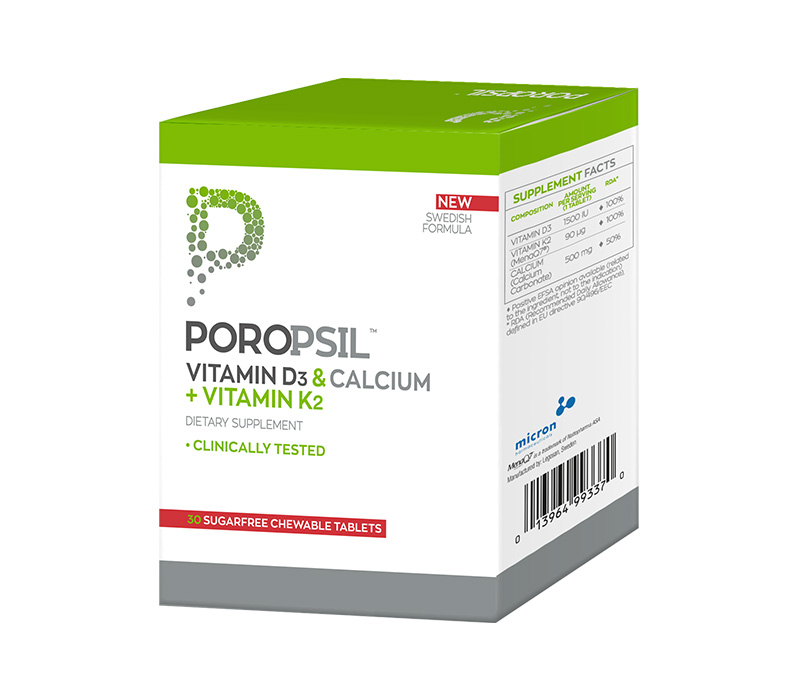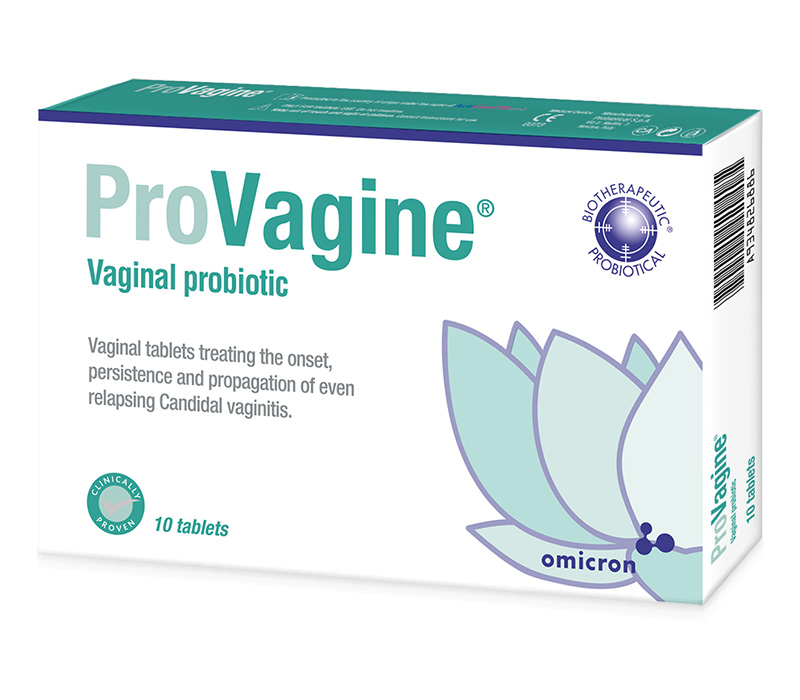MenaCAL/D3®
Overview
Calcium is essential for bone health and for keeping the bone mass in the human skeleton. Sufficient intake of calcium has a significant role in building and maintain ing maximum bone mass and consumers should not doubt the effectiveness of calcium. Most people do not get enough calcium from diet alone, and this is where a calcium supplement can be important to humans of all ages. However, large studies over the past 20 years with as much as 12,000 participants show that calcium taken alone can increase the risk of cardiovascular diseases, myocardial infarction and stroke by as much as 30% according to a study published in British medical Journal. This is called the “Calcium Paradox”.
A unique new calcium supplement with vitamin K2 and vitamin D3 for effective calcium utilization and reduced risk of cardiovascular diseases may be the solution. A recent study published in the British Journal of Nutrition 2016, stated that co-supplementation of vit D, vit K2 & Ca for 12 weeks among diabetic patients with CHD resulted in a significant reduction in left Carotid Intima-Media Thickness (CIMT) vs Placebo.
These Three Ingredients works synergistically , which may assist with:
- Building and maintain strong bones
- Preventing cardiovascular diseases
- Optimizing the peak bone mass
- Reducing the risk of cardiovascular death by nearly 50%
Vitamin K2 ensures an optimal intake of Calcium:
- Before and during menopause to help prevent osteoporosis
- Preventing cardiovascular diseases,Natural vitamin K2 works synergistically with and improves the efficiency of Bisphosphonate to further benefit osteocalcin activation and bone mineral density (BMD)
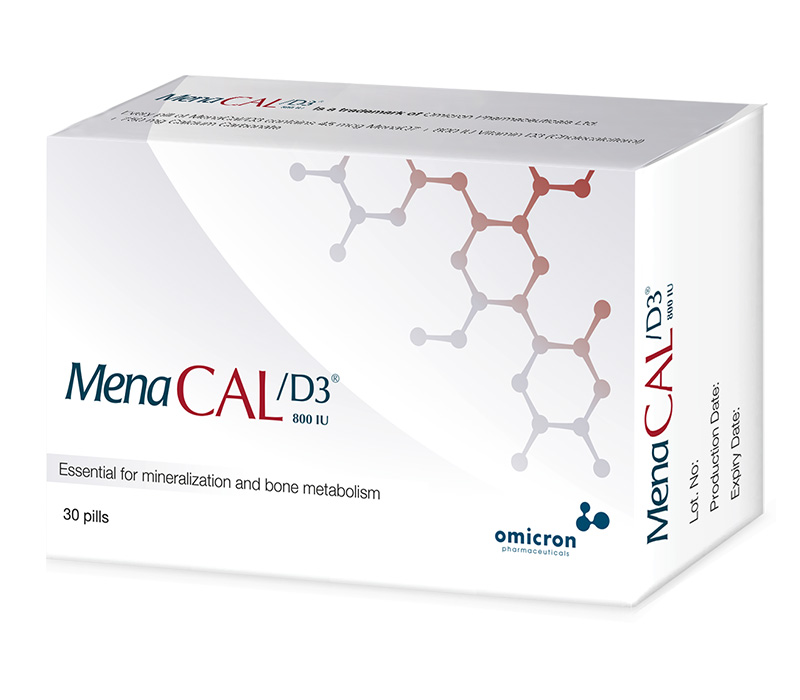
Calcium for healthy bones?
For decades calcium has been the most obvious choice of dietary supplement for improving bone health. However, several studies show that supplementing with calcium exclusively is not enough for optimal bone health. Our bodies need to optimize the use of calcium as excess calcium will stick to the blood vessel walls, making them stiff and less elastic.
Combining vitamin D3, calcium and vitamin K2 significantly improves bone health, because vitamin D3 stimulates the synthesis of osteocalcin, while vitamin K2 is needed for ‘switching’ it on to put the calcium into the bone.

“…A statistically significant increase in the number of women who had a myocardial infarction in the calcium group compared with placebo…”
“… A statistically significant reduction of cardiovascular diseases and death by 50% with every 45 mcg vitamin K2 a day…”
“…9% reduction of risk of Coronary Heart Disease for every 10 mcg natural K2 a day…”
“…Prevention of fractures with Calcium and Vitamin D3 is not enough…combining Vitamin K2, Vitamin D3 and Calcium seems ideal…” British Medical Journal (BMJ 2005)
Read More
Research
Is calcium supplementation a cause for concern?
British medical Journal (BmJ) 2008 “Calcium supplements in healthy post-menopausal women are associated with upward trends in cardiovascular event rates. This potentially detrimental effect should be balanced against the likely benefits of calcium on bone.” This five year study on 1,471 postmenopausal women suggests that “women who take calcium supplements may have increased risk of heart attack, stroke or sudden death; because calcium supplements may accelerate the formation of calcium deposits in the arteries by increasing blood calcium levels.
The Rotterdam Study
Another large epidemiological population-based study published in 2004 – The “Rotterdam study” with 4,473 subjects with no history of myocardial infarction, over a period of 10 years showed a significant 50% eduction in coronary heart disease (CHD) mortality and aortic calcification for those who were in the 45 mcg per day of dietary intake of vitamin K2 in the upper tertile and 25% reduction in 24 mcg per mid tertile compared to the 12.5 mcg per lower tertile. Such dose-response relationship in a population was impressive for the new role of vitamin K2. Their fin ings did not show any correlation between vitamin K1 intakes to the CHD outcome.
The Gast Study
The Gast study published in 2009 with 16,057 participants over 8 years confirmed the Rotterdam study and concluded a 9% reduction in risk of developing CHD for every 10 mcg of natural vitamin K2 consumed. The highest average consumption was >36 mcg K2/day. This study could not confirm a protectve effect of vitamin K1 for coronary calcification and CHD similar to the conclusions of Rotterdam study.
Fortunately the medical community is beginning to accept the importance of Vitamin K2. The natural form as Vitamin K2 is a fat soluble vitamin necessary for the activation of Osteocalcin and matrix Gla-Protein (MGP) for safe and effective calcium utilization. Hence increased calcium intake especially if combined with Vitamin D3, results in increased absorption of Calcium. However, Vitamin K2 aids in safe and effective utilization and thus providing a complete formulation.
Vitamin K2 Reduces The Risk of Cardiovascular Death By 50%!
Bone Health
Calcium, vitamin D3 and vitamin K2 in relation to bone health
It is estimated that one in three women, and one in twelve men, aged higher than 55 will experience osteoporosis in their lifetime. The skeleton requires optimum development and maintenance of its integrity to prevent fractures. There are several studies demonstrating the effect of calcium supplementation to reduce bone loss.
Recent studies demonstrate that the western population exhibits extensive lack of vitamin D3. New literature focuses on the importance of vitamin K2 in addition to vitamin D3 and calcium. It is well known that vitamin K2 is a cofactor for activating the bone building protein osteocalcin. Osteocalcin is the most important protein that ties calcium to the extracellular hydroxyapatite matrix of the bone. Osteocalcin needs to be activated to fulfill this task and vitamin K is the only activator. Thus calcium, vitamin D3 and vitamin K2 are equally important, and they work together to improve bone health: Calcium is needed as the bone building brick, vitamin D3 is needed to increase absorption of calcium from the intestine as well as production of bone-building cells and vitamin K2 is needed for incorporating calcium to the bone structures.
Combating the “Calcium Paradox”
Both men and women are losing calcium when they become older. From the age of 35 we are losing bone mass and height as the illustrations shows (fig. 1 and 2). Especially when women enter menopause, they simultaneously lose calcium from bone and increase its deposition in arteries – a negative “double whammy” called the “Calcium Paradox” which greatly increases the risk of both osteoporosis and cardiovascular disease. The drop in oestrogen causes both problems, but vitamin K2 can help rectify them.
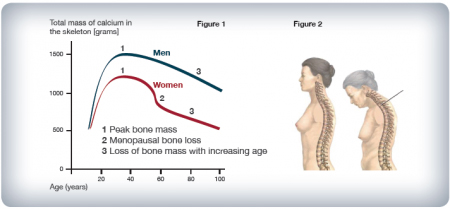
Among postmenopausal women not using oestrogen replacement therapy, low levels of vitamin K2 or high levels of undercarboxylated (vitamin K-dependent) osteocalcin are associated with low spine BMD, but a 3-year study of 325 postmenopausal women, receiving either K2 or placebo, shows that supplementation with K2 can prevent bone loss associated with oestrogen decline. In the women given K2, bone mineral content increased, and hip and bone strength remained unchanged, whereas in the placebo group, bone mineral content and bone strength decreased significantly.
Vitamin K2 for Bones
Vitamin K2 for healthy bones
Vitamin K2 is arguably the most interesting vitamin of this decade. Its function is unique and its beneficial effects on bone and cardiovascular health have been clearly documented.
- Strong bones developed in childhood and maintained afterward reduces the risk of osteoporotic fracture as high peak bone mass buffers bone loss later in life.
- K2 vitamins are required in order to utilize calcium to make bone matrix healthy. K2 vitamins activate a protein involved in the bone builing process, namely osteocalcin, which is capable of binding calcium to the mineral part of bone, thus strengthening the skeleton.
- Vitamin K2 deficiency leads to the synthesis of inactive osteocalcin species that cannot bind calcium to the surface of bone.
- The majority of adults and children are vitamin K2 deficient.
Strongly recommending vitamin K2
Industry experts are now strongly recommending vitamin K2 supplementation to help ensure bone and heart health: “the goal should be to provide supplements that help put calcium in the bones where it is needed, and keep it out of the soft tissues and arteries, where it can be harmful. Recent research has shown that vitamin K2 plays a vital role in calcium utilization, and we believe it should be included in all calcium supplements”.
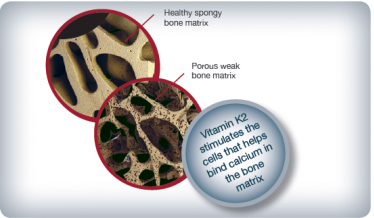
Safety
MenaCAL/D3® Safety
Avoiding unwanted calcification and simultaneously keeping healthy bones is important for millions of people all over the world. It is thus vital to know that natural vitamin K2 is safe. Present studies show that 45 mcg of Vitamin K2 does not interfere with blood-thinning medicines, and as such Vitamin K2 does not provoke any additional risk of clot formation inside blood vessels.
Vitamin K2 is recognized by FDA GRAS association in the US as supplement safe to use.
MenaCAL/D3® contains (Per two pills):
45 mcg Vitamin K2 (MenaQ7) + 600 mg Calcium (elementary) + 800 IU Vitamin D3.
